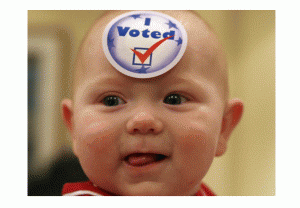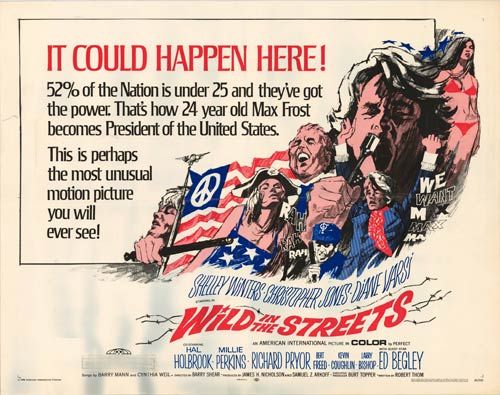San Francisco could drop voting age to 16
 With shades of the 1960s Youth Movement, San Francisco might drop its voting age to 16 from 18. Doing so only would affect city elections, as other elections are affected by state and federal voting laws. Yet Fog City often has been a harbinger of national trends.
With shades of the 1960s Youth Movement, San Francisco might drop its voting age to 16 from 18. Doing so only would affect city elections, as other elections are affected by state and federal voting laws. Yet Fog City often has been a harbinger of national trends.
The reform is the idea of Supervisor John Avalos. He said, “I have seen the power of young people to be able to make changes and positive contributions to their community, and it makes sense to give them the right to vote.”
According to the San Francisco Chronicle, “Avalos and other supporters say it will encourage civic engagement among youths and instill in them lifelong voting habits at a time when turnout is low.” In addition, “Sixteen-year-olds can drive, work, pay taxes and be sentenced to life in prison.”
On March 16, two youngsters from the San Francisco Youth Commission led chants before City Hall on reducing the voting age. Said one of them, Joshua Cardenas, an 18-year-old senior at Archbishop Riordan High School, “You can drive, you can work, you can pay taxes and you can be tried in adult court, and yet you are denied the right to vote. There is a contradiction there. Certainly, they have the knowledge and competence to vote at 16.”
Opposition
“It’s a terrible idea,” John J. Pitney Jr. told the Chronicle; he’s a political science professor at Claremont McKenna College. “Sixteen-year-olds have a lot going for them, but civic judgment isn’t one of those things.”
“There isn’t a single age at which an adolescent becomes like an adult for purposes of thinking through things. It really depends on the issue and domain,” said Laurence Steinberg, a psychology professor at Temple University.
Conservatives also point out that people ages 16-17 commonly hold more liberal views than the general electorate.
Moreover, one survey indicated that, until they go to college, kids’ political views closely mirror those of their parents. According to a study by the National Social Sciences Association, 96 percent of high-school students’ political views “matched their parent/guardians’ political views. … Although teachers long for students to develop political beliefs based on research, this study concludes that most will follow in their parents/guardians’ foot steps.”
The implication is that, if the voting age were dropped, the voting clout most increased would be that of parents of the new voters; while everyone else’s clout would be reduced slightly.
1960s agitation
The 1960s arguments for dropping the voting age to 18 from 21 largely concerned the draft and the Vietnam War. The age of most draftees was 19. And large numbers of the 550,000 troops in in Vietnam at the height of the war were under 21.
As longtime Sen. Edward M. Kennedy, D-Mass., said in 1970 in hearings before the Senate Subcommittee on Constitutional Amendments:
“The well-known proposition — ‘old enough to fight, old enough to vote’ — deserves special mention. To me, this part of the argument for granting the vote to 18-year-olds has great appeal. At the very least, the opportunity to vote should be granted in recognition of the risks an 18 year-old is obliged to assume when he is sent off to fight and perhaps die for his country. About 30 percent of our forces in Vietnam are under 21. Over 19,000, or almost half, of those who have died in action there were under 21. Can we really maintain that these young men did not deserve the right to vote?”
In the San Francisco situation, such an argument would not be too strong. Although America is engaged in wars in Iraq and elsewhere, there is no draft and one isn’t likely anytime soon, although there is draft registration for young men (not young women). And although the military accepts 17-year-olds with parental consent, the long months of training in the modern military mean almost no one will be 18 before going into a war or potential war.
Education
There were other reasons for lowering the voting age to 18, which was accomplished in 1971 by the 26th Amendment to the U.S. Constitution. Among other things, Kennedy said:
“Our young people today are far better equipped — intellectually, physically and emotionally — to make the type of choices involved in voting than were past generations of youth. … Because of the enormous impact of modern communications, especially television, our youth are extremely well informed on all the crucial issues of our time, foreign and domestic, national and local, urban and rural.
“Today’s 18-year-olds, for example, have unparalleled opportunities for education at the high school level.”
Some of those arguments might be pertinent today to further reducing the voting age to 16, including the spread of the Internet and social media.
On the other hand, California’s schools, which led the nation during the so-called “Golden Age” of 1960s education, since have fallen near the bottom on national tests.
‘Wild in the Streets’
As it usually does, San Francisco will sort things out on its own.
But the debate has an amusing element because of a classic cult movie made during the debate over the voting age, 1968’s “Wild in the Streets.” A youth movement is led by a Jim Morrison imitator named Max Frost, 24. His hit song, “Fourteen or Fight,” demands dropping the voting age to 14.
In a compromise with a senator played by Hal Holbrook, the age is dropped to 15. The youth the elect Max president.
Look for a young Richard Pryor as Stanley X, the drummer in Max’s group.
It’s a parody. But sometimes parodies become reality.

John Seiler
John Seiler has been writing about California for 25 years. That includes 22 years as an editorial writer for the Orange County Register and two years for CalWatchDog.com, where he is managing editor. He attended the University of Michigan and graduated from Hillsdale College. He was a Russian linguist in U.S. Army military intelligence from 1978 to 1982. He was an editor and writer for Phillips Publishing Company from 1983 to 1986. He has written for Policy Review, Chronicles, LewRockwell.com, Flash Report and numerous other publications. His email: [email protected]
Related Articles
Assembly passes grocery employment mandate
If you purchase a grocery store that is going out of business because its employees have not provided good customer
Paper Campaign Records Doomed
DEC. 15, 2010 Yesterday marked the final formal hearing of the Political Reform Act Task Force. Since early September, I’ve
Flat Tax idea revived
Jan. 15, 2010 By JOHN SEILER Challenging times demand innovative answers to problems. This is such a time for the



